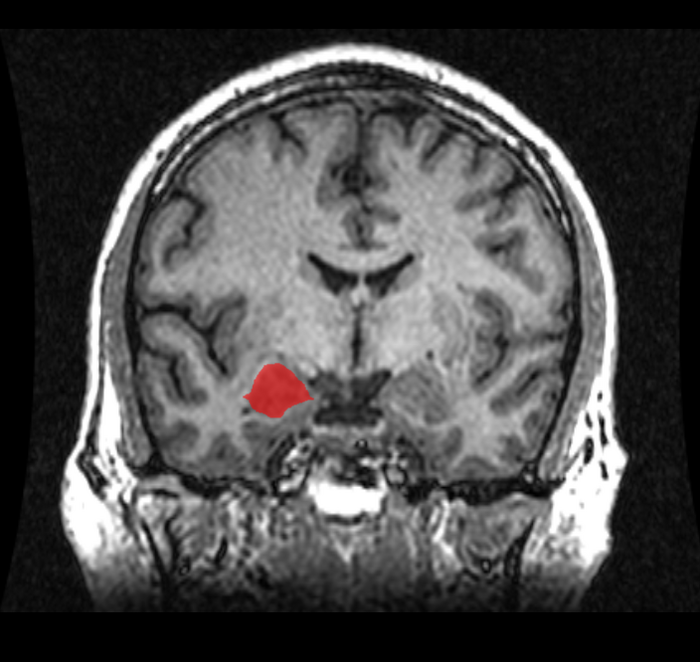Tucked into the temporal lobe, near the base of our brain, sits a small, almond-shaped region called the amygdala that processes our emotions. Neuroscientists at Tufts University have been investigating the symphony of signals created within a subsection of this area—the basolateral amygdala—to better understand how they contribute to negative feelings such as anxiety and fear.

Credit: “File:MRI Location Amygdala up.png” by Amber Rieder, Jenna Traynor, Geoffrey B Hall is marked with CC0 1.0.
Tucked into the temporal lobe, near the base of our brain, sits a small, almond-shaped region called the amygdala that processes our emotions. Neuroscientists at Tufts University have been investigating the symphony of signals created within a subsection of this area—the basolateral amygdala—to better understand how they contribute to negative feelings such as anxiety and fear.
“This emotional processing hub plays a role in a lot of different behaviors,” said Jamie Maguire, a Kenneth and JoAnn G. Wellner Professor in the neuroscience department at Tufts University School of Medicine and a member of the neuroscience program faculty at the Graduate School of Biomedical Sciences (GSBS). “We’re interested in how the network switches into these negative states, which is relevant to many different disorders, such as depression and post-traumatic stress disorder.”
In a recent paper published in the journal eNeuro, Maguire and her colleagues found that alcohol can change the pattern of activity in the basolateral amygdala in a mouse model, essentially telling the brain’s orchestra to play a different tune. This is the first study to show that alcohol is capable of altering these patterns, often referred to as network states. Their work opens the door to a better understanding of how the brain switches between different activity patterns associated with anxiety or other moods, which also may be relevant to alcohol dependence.
“We know one of the reasons people drink is to relieve anxiety or stress, which are associated with this area of the brain,” said Alyssa DiLeo, who is first author on the paper and was a GSBS doctoral student in Maguire’s lab at the time of the study. “Uncovering how alcohol changes these network states may be the first step in understanding the transition from first drink to an alcohol use disorder.”
The researchers found that alcohol can essentially shift a mouse’s brain to less of an anxious state and toward a more relaxed one. They were also able to identify specific receptors in the basolateral amygdala, known as delta subunit-containing GABA-A receptors, as an important part of the signaling network that causes this switch.
The effects were slightly different in male and female mice, Maguire said. Females seemed to need more alcohol than males to alter their network state, which might be related to the fact that female mice have fewer of the relevant receptors. Moreover, when the researchers deleted these receptors in male mice, the altered mice responded like their female counterparts.
“That tells us that these receptors are playing a role in these sex differences and how alcohol affects the basolateral amygdala network,” Maguire said.
A Fearful State of Mind
Earlier this year, Maguire and her team partnered with Tulane University cell and molecular biology professor Jeffrey Tasker and other researchers to pinpoint a different set of receptors in the basolateral amygdala that seem to be relevant to an animal’s fear response. In a study published in Nature Communications, the researchers used norepinephrine, a similar hormone to adrenaline, to stimulate the basolateral amygdala in mice and switch them into a fearful state.
Norepinephrine can interact with several neural receptors, but when the researchers deactivated one in particular, the α1A adrenoreceptor, the animals’ brains no longer went into the fearful mode.
“If you block norepinephrine’s ability to communicate with cells through this receptor, then you lose norepinephrine’s ability to create a fear state,” said Eric Teboul, a GSBS doctoral student in Maguire’s lab and lead author on the paper. “Being able to create a binary behavior—fearful or not fearful—gives us insight into how the brain actually computes and does things.”
By understanding the molecular interactions that switch the basolateral amygdala into and out of these negative network states, the researchers may find potential drug targets to help people treat mood disorders and addiction. A person suffering from post-traumatic stress disorder, for example, might be stuck in a fearful pattern of neural activity. Disrupting that pattern could help them recover.
Of course, it won’t be as simple as switching these circuits on or off, Teboul said.
“You don’t want to just take out the fear; you don’t want to take out the sadness; you don’t want to take out the stress, because there are good reasons that we feel stressed and fearful of things,” he said. “We want to understand how this amygdala region computes things so that we can balance it at a normal level.”
Journal
eNeuro
DOI
10.1523/ENEURO.0010-22.2022
Article Title
Sex differences in the alcohol-mediated modulation of BLA network states
Article Publication Date
4-Jul-2022




